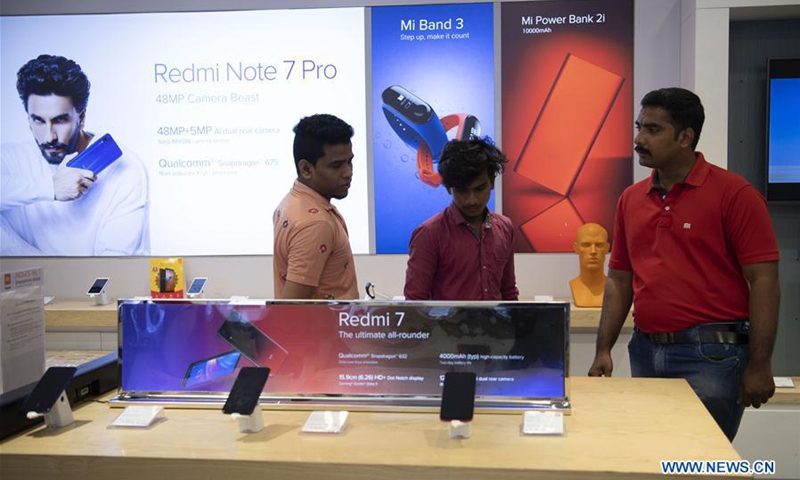
Customers are seen at a store of Chinese technology company Xiaomi in Chennai, India, Oct. 8, 2019. (Xinhua/Lui Siu Wai)
India cannot bear the consequences of losing the participation of Chinese companies in its infrastructure and 5G rollout, and the scrutiny leveled at Chinese technology products may decouple the country from global 5G development, analysts said.
The comment came after India's Minister for Road Transport and Highways Nitin Gadkari said no Chinese company will be allowed to participate in future highway projects in India.
The quick shift in Gadkari's attitude may work as a remedial action to rescue his political career as the minister had urged India to remove the obstacles to facilitate the release of imported Chinese goods piling up at Indian ports, but this soon provoked uproar among radical Indians.
Meanwhile, the Indian government started domestic consultations to decide on the use of 5G, seen as a precursor to a possible ban on Huawei and ZTE, the Times of India reported on Tuesday. The talks came along with the discussion to block 59 mobile apps developed by Chinese firms.
Indian people, misled by some local trade groups' emotional appeals against Chinese technologies and products, are actually staking the prosperity of the Indian economy on venting their anger, experts said.
The harsh reality confronting the ambitious yet fragile South Asian economy is that they cannot find viable alternatives to Chinese offerings, Wang Dehua, head of the Institute for South and Central Asian Studies at the Shanghai Institutes for International Studies, told the Global Times on Thursday.
The spread of the boycott campaign to the sphere of IT technologies and mobile applications should serve as a wakeup call for locals to avoid indulging in populism, Wang said.
The market size of the telecom equipment in India is around Rs 12,000 crore (about $1.59 billion) and Chinese equipment accounts for about 25 percent, the Financial Express reported, adding local telecom operators may suffer from an increase of 15-20 percent in their procurement costs if Chinese vendors are banned.
For instance, India's 4G Bharti Airtel and Vodafone Idea networks were largely built by Huawei and ZTE, the report noted.
The Cellular Operators' Association of India (COAI) - whose members include private telecom firms, have suggested separating commercial decisions from geopolitics.
"Geopolitical issues are the provenance of the government and such decisions are distinct and should ideally be kept separate from commercial decisions, which are the provenance of companies," Rajan Mathews, director general of COAI, told PTI.
Describing the boycotts as a plot by New Delhi to emulate the Trump administration's push to pass the buck of a failed response to the COVID-19 outbreak to China, Wang commented that it would be much wiser if India can hold onto its longstanding wisdom in dealing with major powers.
If India bans Huawei and ZTE from its telecom building, it will lead to the country's decoupling with global 5G networking building, Liu Dingding, a Beijing-based independent tech industry analyst, told the Global Times on Thursday.
"All of India's current measures against China are superficial and sentimental. It will not move away from China further and further as it just wants to gain more profits from China and Chinese companies," Liu said, noting the country will not give up Huawei in the end as the order does not conform to the country's core strategy.
On Thursday, Chinese Ministry of Commerce spokesperson Gao Feng said China does not imposed any restrictive or discriminatory measures targeting Indian products and services.
"The success of China-India economic cooperation today is the result of joint efforts from both sides, and serves the fundamental interests of the countries' peoples," Gao said, adding he hoped the two countries should promote sound and stable economic and trade cooperation.




